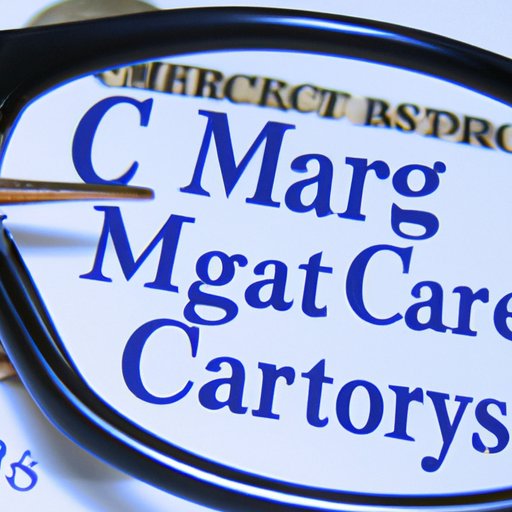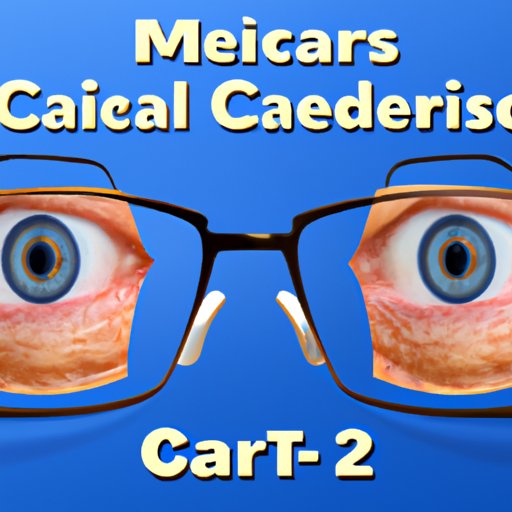Introduction
Cataract surgery is a type of eye surgery that removes the clouded lens from a person’s eye and replaces it with an artificial lens. This surgery can improve vision and reduce the risk of further vision loss due to cataracts. Medicare is a health insurance program that helps pay for certain medical services and supplies, including cataract surgery. In this article, we will explore what Medicare covers on cataract surgery, the cost of the procedure, and the different types of coverage available.

Exploring the Cost of Cataract Surgery and What Medicare Pays For
Cataract surgery is typically an outpatient procedure that is covered by most health insurance plans, including Medicare. The cost of cataract surgery can vary depending on the type of procedure you choose and the provider you use. Generally, the out-of-pocket cost for cataract surgery ranges from $3,000 to $5,000 per eye, depending on the type of lens implant chosen. Medicare will usually cover some or all of these costs, depending on the type of plan you have.
Medicare will typically cover 80% of the cost of cataract surgery after you have met your deductible. This means that you will be responsible for paying the remaining 20%, as well as any other applicable co-pays and coinsurance. The amount you will be responsible for will depend on the type of Medicare plan you have and whether you have supplemental insurance to help cover the remaining costs.

What You Need to Know About Medicare Coverage for Cataract Surgery
The first step in determining what Medicare covers for cataract surgery is to research the different types of Medicare plans available. There are four main types of Medicare plans: Original Medicare (Parts A and B), Medicare Advantage (Part C), Medicare Supplement Insurance (Medigap), and Prescription Drug Plans (Part D). Each of these plans offers different levels of coverage and benefits, so it is important to understand how each one works before making a decision.
Once you have chosen a plan, you will need to review the deductibles, co-pays, and coinsurance associated with it. These are all fees that are not covered by Medicare and must be paid out-of-pocket. The amount of these fees will vary based on the plan you have chosen and may change over time. It is important to review these fees regularly to ensure you are getting the best coverage for your money.
What is Covered Under a Medicare Plan When it Comes to Cataract Surgery?
When it comes to cataract surgery, Medicare plans typically cover pre-operative and post-operative care, cataract removal and lens implantation, and follow-up visits and prescription medications. Pre-operative care includes doctor visits for diagnosing and evaluating your condition, as well as any tests or procedures needed prior to surgery. Post-operative care includes follow-up visits and any necessary medication or treatment after the surgery.
Medicare also typically covers the cost of cataract removal and lens implantation. This includes the cost of the lens implants as well as the anesthesia used during the surgery. Medicare will also typically cover the cost of follow-up visits and any necessary prescription medications after the surgery.

A Guide to Understanding What Medicare Covers for Cataract Surgery
When researching different Medicare plans, it is important to compare the coverage and costs of each one. Some plans may offer better coverage for cataract surgery, while others may have higher deductibles or co-pays. It is also important to consider any additional benefits that may be included in the plan, such as vision care or hearing care.
It is also important to keep in mind that Medicare plans may change over time. Be sure to check with your plan administrator regularly to make sure you are still getting the best coverage and value for your money.
Comparing Medicare Coverage for Different Types of Cataract Surgery
When considering cataract surgery, it is important to understand the different types of procedures available and the coverage offered by Medicare for each. Traditional cataract surgery involves removing the cloudy lens from the eye and replacing it with an artificial lens. Laser-assisted cataract surgery uses a laser to create a small incision in the eye, allowing the surgeon to access the lens more easily. Multifocal or toric intraocular lenses are advanced lenses that can provide improved vision for patients with astigmatism or presbyopia.
When comparing Medicare plans, it is important to consider the coverage and costs associated with each type of cataract surgery. Medicare plans typically cover traditional cataract surgery, but they may not cover laser-assisted cataract surgery or multifocal or toric intraocular lenses. Be sure to read the plan details carefully to understand the coverage offered.
Conclusion
Cataract surgery is a common procedure that can improve vision and reduce the risk of further vision loss due to cataracts. Medicare is a health insurance program that helps pay for certain medical services and supplies, including cataract surgery. When researching different Medicare plans, it is important to understand what is covered and what out-of-pocket costs you may be responsible for. Different types of cataract surgery may have different levels of coverage, so be sure to compare plans carefully to get the best coverage for your needs.
By understanding what Medicare covers for cataract surgery, you can make an informed decision about the best plan for you. With the right plan, you can get the care you need without breaking the bank.
(Note: Is this article not meeting your expectations? Do you have knowledge or insights to share? Unlock new opportunities and expand your reach by joining our authors team. Click Registration to join us and share your expertise with our readers.)
